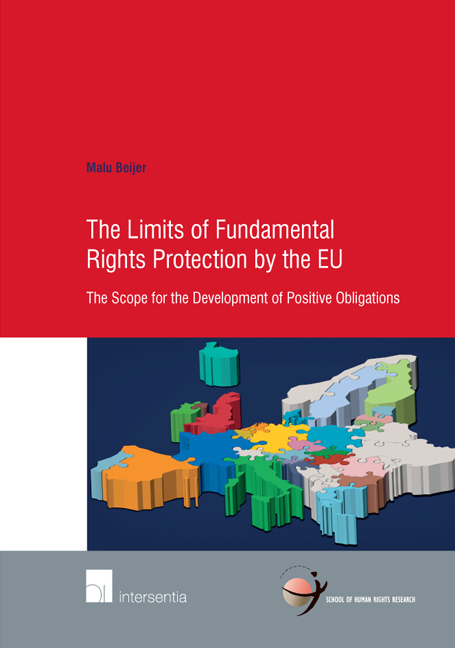 Limits of Fundamental Rights Protection by the EU
Limits of Fundamental Rights Protection by the EU from PART III - SYNTHESIS
Published online by Cambridge University Press: 27 September 2018
INCORPORATING POSITIVE OBLIGATIONS TO PROTECT FUNDAMENTAL RIGHTS IN EU LAW?
The main purpose of this study was to establish whether there is scope for recognition of a concept of positive obligations to protect fundamental rights under EU law and, if so, in what manner the ECJ could develop a doctrine of positive obligations in its case-law. To find answers to these questions, this study, first, has drawn inspiration from the case-law of the ECtHR. Part I of this study has explained in what way states can incur positive obligations to protect fundamental rights under the Convention, and what the effects are of the recognition of such positive obligations by the ECtHR. In addition, part I has dealt with the criticisms related to this development. It has inter alia explained that states ‘ obligations in relation to the protection of fundamental rights have been expanded on the basis of the recognition of positive obligations; these obligations may require burdensome measures to be taken by states; the development of positive obligations creates a certain amount of legal uncertainty; and the establishment of positive obligations by the ECtHR may come close to political decision-making. These types of criticism have (partially) been overcome by the principles that have been established by the ECtHR in its case-law. The ECtHR has explained that positive obligations form part of the effective protection of fundamental rights, and that states nowadays have the power to influence the enjoyment of individual ‘ s fundamental rights. The ECtHR also recognises that states are given discretion when choosing the measures to provide protection, and that certain limits apply to the scope for positive obligations under the Convention. These principles, as well as their more specific elaborations, have been held to be of special interest if the ECJ were to recognise similar kinds of positive obligations.
Part II of this study has explored the system of EU fundamental rights protection and some of its specific limitations, in order to find out whether, and to what extent, this allows for a similar development of positive obligations to take place. Specific attention was paid to the ECJ ‘ s own institutional characteristics and its judicial culture; to the issue of the limited competences of the EU; and to the limited scope of application of EU fundamental rights.
To save this book to your Kindle, first ensure no-reply@cambridge.org is added to your Approved Personal Document E-mail List under your Personal Document Settings on the Manage Your Content and Devices page of your Amazon account. Then enter the ‘name’ part of your Kindle email address below. Find out more about saving to your Kindle.
Note you can select to save to either the @free.kindle.com or @kindle.com variations. ‘@free.kindle.com’ emails are free but can only be saved to your device when it is connected to wi-fi. ‘@kindle.com’ emails can be delivered even when you are not connected to wi-fi, but note that service fees apply.
Find out more about the Kindle Personal Document Service.
To save content items to your account, please confirm that you agree to abide by our usage policies. If this is the first time you use this feature, you will be asked to authorise Cambridge Core to connect with your account. Find out more about saving content to Dropbox.
To save content items to your account, please confirm that you agree to abide by our usage policies. If this is the first time you use this feature, you will be asked to authorise Cambridge Core to connect with your account. Find out more about saving content to Google Drive.